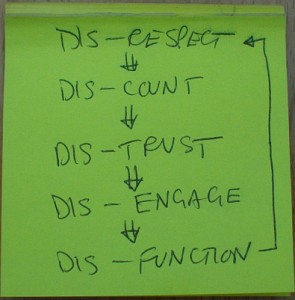 Do you ever go into places where there is a feeling of uneasiness?
Do you ever go into places where there is a feeling of uneasiness?
You can feel it almost immediately – there is something in the room that no one is talking about.
An invisible elephant in the room, a rotting something under the table.
This week I have been pondering the cause of this dis-ease and my eureka moment happened while re-reading a book called “The Speed of Trust” by Stephen R. Covey.
A common elephant-in-the-room appears to be distrust and this got me thinking about both the causes of distrust and the effects of distrust. My doodle captures the output of my musing. For me, a potent cause of distrust is to be discounted; and discounting comes from disrespect. This can happen both within yourself and between yourself and others. If you feel un-trust-worthy then you tend to disengage; and by disengaging the system functions less well – it becomes dysfunctional. Dysfunction erodes respect and so on around the vicious circle.
This then led me to the question: Why haven’t we all drowned in our own distrust by now? I believe what happens is that we reach an equilibrium where our level of trust is stable; so there must be a counteracting trust-building force that balances the trust-eroding force. That trust-building force seem to comes from our day-to-day social interactions with others.
The Achilles Heel of negative-cause-effect circles is that you can break into them at many points to sap their power and reduce their influence. So, one strategy might be to identify the Errors of Commission that create the Disease of Distrust.
Consider the question: “If I have developed a high level of trust then what could I do to erode it as quickly as possible?”.
Disrespectful attitude and discounting behaviour would be all that is needed to start the vicious downward spiral of distrust disease.
Who of us never disrespects or discounts others?
Are we all infected with the same disease?
Is there a cure or can we only expect to hold it in remission?
How can we strengthen our emotional immune systems and neutralise the infective agents of the Disease of Distrust?
Do we just need to identify and stop our trust eroding behaviour?
That would be a start.
